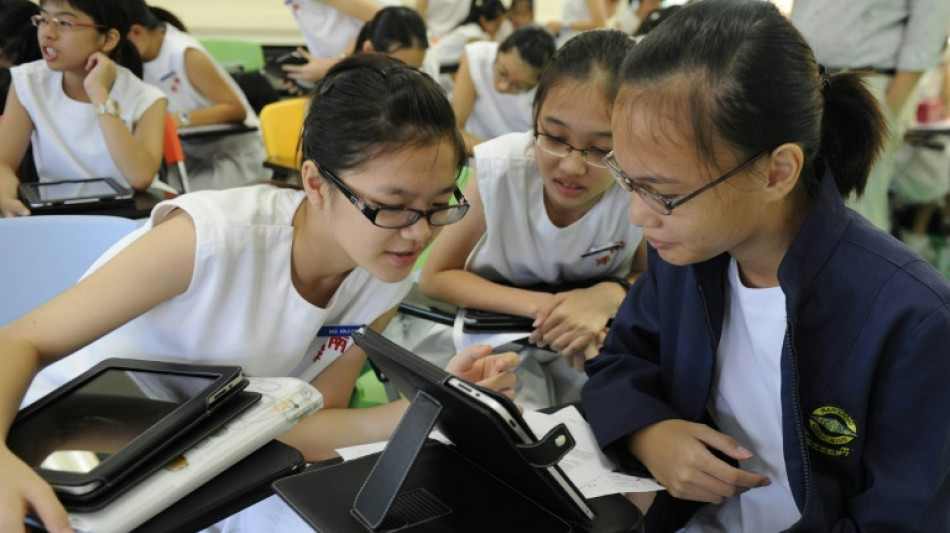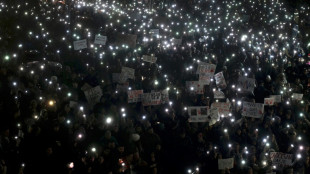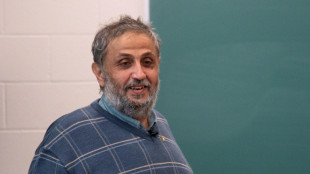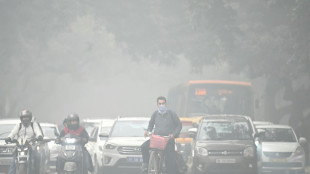
-
 Sweeping Vietnam internet law comes into force
Sweeping Vietnam internet law comes into force
-
Thousands attend Christmas charity dinner in Buenos Aires

-
 Demand for Japanese content booms post 'Shogun'
Demand for Japanese content booms post 'Shogun'
-
Mystery drones won't interfere with Santa's work: US tracker

-
 Global stocks mostly higher in thin pre-Christmas trade
Global stocks mostly higher in thin pre-Christmas trade
-
NASA probe makes closest ever pass by the Sun

-
 Global stocks mostly rise in thin pre-Christmas trade
Global stocks mostly rise in thin pre-Christmas trade
-
Global stocks mostly rise after US tech rally

-
 Investors swoop in to save German flying taxi startup
Investors swoop in to save German flying taxi startup
-
Saving the mysterious African manatee at Cameroon hotspot

-
 The tsunami detection buoys safeguarding lives in Thailand
The tsunami detection buoys safeguarding lives in Thailand
-
Asian stocks mostly up after US tech rally

-
 US panel could not reach consensus on US-Japan steel deal: Nippon
US panel could not reach consensus on US-Japan steel deal: Nippon
-
The real-life violence that inspired South Korea's 'Squid Game'

-
 El Salvador Congress votes to end ban on metal mining
El Salvador Congress votes to end ban on metal mining
-
Five things to know about Panama Canal, in Trump's sights

-
 Mixed day for global stocks as market hopes for 'Santa Claus rally'
Mixed day for global stocks as market hopes for 'Santa Claus rally'
-
Trump's TikTok love raises stakes in battle over app's fate

-
 European, US markets wobble awaiting Santa rally
European, US markets wobble awaiting Santa rally
-
NASA solar probe to make its closest ever pass of Sun

-
 Volkswagen boss hails cost-cutting deal but shares fall
Volkswagen boss hails cost-cutting deal but shares fall
-
Sweden says China blocked prosecutors' probe of ship linked to cut cables

-
 UK economy stagnant in third quarter in fresh setback
UK economy stagnant in third quarter in fresh setback
-
Global stock markets edge higher as US inflation eases rate fears

-
 US probes China chip industry on 'anticompetitive' concerns
US probes China chip industry on 'anticompetitive' concerns
-
Mobile cinema brings Tunisians big screen experience

-
 Honda and Nissan to launch merger talks
Honda and Nissan to launch merger talks
-
Asian markets track Wall St rally as US inflation eases rate fears

-
 Honda and Nissan expected to begin merger talks
Honda and Nissan expected to begin merger talks
-
Asian markets track Wall St rally as US inflation eases rate worries

-
 Trump vows to 'stop transgender lunacy' as a top priority
Trump vows to 'stop transgender lunacy' as a top priority
-
Beyond Work Unveils Next-Generation Memory-Augmented AI Agent (MATRIX) for Enterprise Document Intelligence

-
 Sweet smell of success for niche perfumes
Sweet smell of success for niche perfumes
-
'Finally, we made it!': Ho Chi Minh City celebrates first metro

-
 Tunisia women herb harvesters struggle with drought and heat
Tunisia women herb harvesters struggle with drought and heat
-
Trump threatens to take back control of Panama Canal

-
 Secretive game developer codes hit 'Balatro' in Canadian prairie province
Secretive game developer codes hit 'Balatro' in Canadian prairie province
-
Stellantis backtracks on plan to lay off 1,100 at US Jeep plant

-
 Banned Russian skater Valieva stars at Moscow ice gala
Banned Russian skater Valieva stars at Moscow ice gala
-
Biden signs funding bill to avert government shutdown

-
 Sorrow and fury in German town after Christmas market attack
Sorrow and fury in German town after Christmas market attack
-
France's most powerful nuclear reactor finally comes on stream

-
 Sierra Leone student tackles toxic air pollution
Sierra Leone student tackles toxic air pollution
-
Amazon says US strike caused 'no disruptions'

-
 Qualcomm scores key win in licensing dispute with Arm
Qualcomm scores key win in licensing dispute with Arm
-
Scientists observe 'negative time' in quantum experiments

-
 US approves first drug treatment for sleep apnea
US approves first drug treatment for sleep apnea
-
Amazon expects no disruptions as US strike goes into 2nd day

-
 US confirms billions in chips funds to Samsung, Texas Instruments
US confirms billions in chips funds to Samsung, Texas Instruments
-
Wall Street rebounds despite US inflation ticking higher


Asian countries score high in key education survey
Asian countries dominated the top spots in a keenly watched survey of education capabilities published Tuesday, while levels in Europe slipped at a record pace -- and not just because of Covid.
However, the report also showed that students in top performing countries were not necessarily happier.
The PISA survey is carried out every three years by the Paris-based Organisation for Economic Cooperation and Development (OECD) to assess the ability of 15-year-olds to meet real-life challenges.
"The Pisa 2022 results show a fall in student performance that is unprecedented in Pisa's history," OECD education analyst Irene Hu told reporters.
Singapore took top ranking in the latest assessment, which was carried out in 2022 and involved 690,000 students in 81 participating countries and economies.
The south-east Asian island city state scored highest in all three of the survey's areas: mathematics, reading and science.
"These results suggest that, on average, Singaporean students are the equivalent of almost three to five years of schooling ahead of their peers," the report said.
Five other Asian education systems -- in Macao, Taiwan, Hong Kong, Japan and South Korea -- came next in mathematics, and also scored near the top in reading and science.
But while Asia did well, other parts of the world declined, sparking an overall "unprecedented drop in performance", the report said.
Germany, Iceland, the Netherlands, Norway and Poland, for example, all saw notably lower achievements in mathematics, it said.
- 'Not just about Covid' -
Covid-19 shutdowns hurt education standards, the report said, but there were also other factors behind the downturn.
Students in Finland, Iceland and Sweden -- once star performers -- have been scoring lower marks for years.
"This indicates that long-term issues in education systems are also to blame for the drop in performance," it said. "It is not just about Covid."
A key factor is "the level of support pupils received from teachers and school staff", the OECD's Hu said.
Some education systems have not given sufficient resources for supporting students, said Eric Charbonnier, another OECD education analyst.
"Countries have invested in education over the past 10 years, but maybe they didn't invest efficiently, or sufficiently into the quality of teaching," he said.
"We also see less parental involvement with the progress of children compared to 2018," he added.
While there was some correlation between spending and academic performance, "history shows that countries determined to build a first-class education system can achieve this even in adverse economic circumstances", the report said.
"The world is no longer strictly divided between rich and well-educated nations and poor and badly-educated ones", it said.
In some cases, 2022's drop in skills amounted to roughly a year's worth of education.
"For example, in mathematics, in Denmark, France, Greece, Portugal and Sweden, the average 15-year-old in 2022 scored at the level expected of a 14-year-old in 2018," the report said.
The best European performer was Estonia. The EU's two biggest countries, Germany and France, ranked below Switzerland, Ireland, Belgium and Britain.
"Germany is more worrying than France," said Charbonnier, adding that Norway and Finland also declined more than France.
The US education system showed little change from the last survey, with students there weaker in mathematics, and slightly above average in reading and science.
- 'Fear of failure' -
For the first time, the OECD also examined the happiness of students, using nine aspects of their lives to measure their well-being.
They include engagement with school, material and cultural well-being, openness to diversity and psychological well-being.
This showed that in top maths performers Singapore, Macao and Taiwan, "many students reported a high fear of failure and limited engagement in extracurricular activities such as sports".
In contrast, with students in countries with lower average PISA test scores, such as Spain and Peru, researchers often found "lower levels of anxiety and a greater focus on sports".
A.Samuel--CPN




